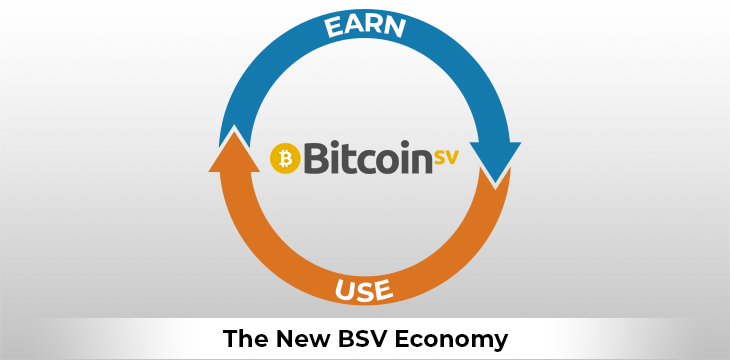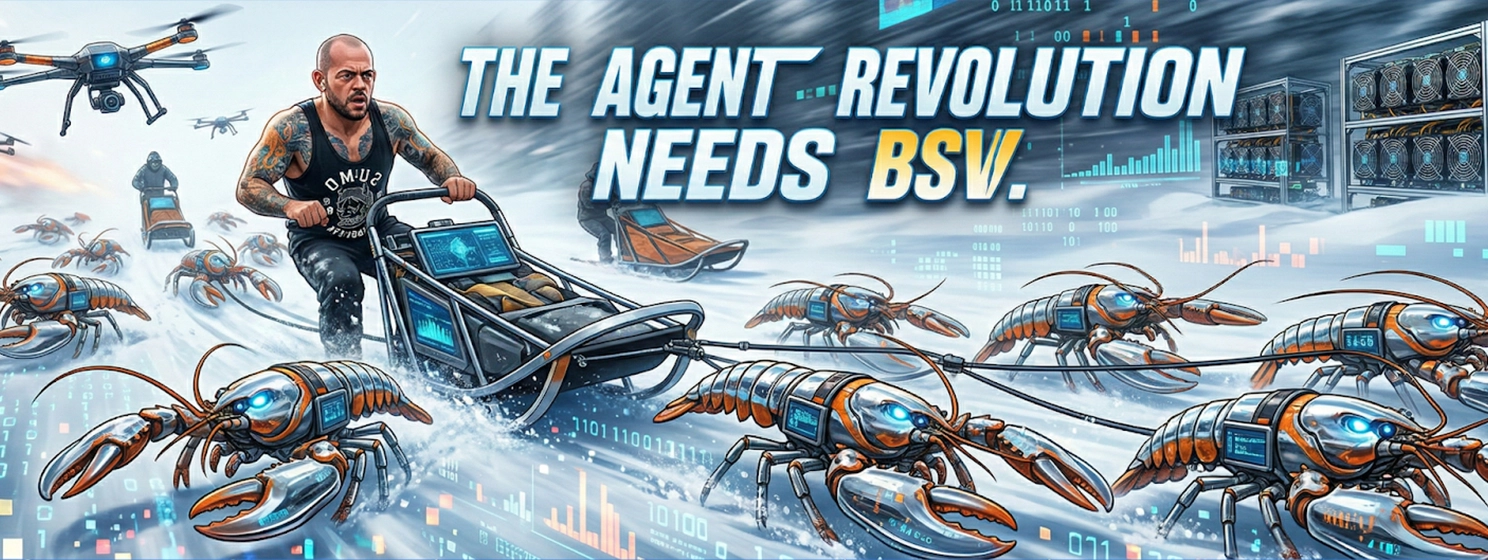|
Getting your Trinity Audio player ready...
|
Bitcoin SV (BSV) is igniting cultural changes in the digital currency world as it restores the “Satoshi Vision” of Bitcoin’s creator Satoshi Nakamoto. BSV’s massive scaling roadmap will support bigger volumes of transactions while keeping transaction fees tiny to enable micropayments. This is creating a paradigm shift for Bitcoin to move away from today’s cryptocurrency exchange-dependent model where you “buy and hold” coins, to a new self-empowering world where people “earn and use” Bitcoin. By finally fulfilling Bitcoin’s original vision, BSV will create a new recursive digital economy in which Bitcoin is actually used in daily life as it was born to be: a peer-to-peer electronic cash system.
Why Bitcoin Core (BTC) got trapped in the “Buy and Hold” paradigm
Let’s begin by looking at why the prior Bitcoin ecosystem has not yet created a true digital economy. Over 10 years since Bitcoin was introduced, relatively few people hold coins and there are not practical ways to actually use Bitcoin. Globally, it is estimated there are 32 million Bitcoin wallets but only 7.1 million active Bitcoin users (just 1/10 of 1% of the world’s 7 billion population). Unless you are a miner earning newly minted coins, Bitcoin is a digital currency that you must buy from an exchange; and then most buyers just hold (or HODL) hoping for investment gain. The current paradigm depends heavily on acquiring coins from cryptocurrency exchanges.
But that’s not how the rest of our money life operates. Except when exchanging foreign currencies, we do not buy fiat currency in order to spend or use it. Money generally comes into our pockets when we earn it — through payroll or other means. We then spend or use earned money as part of a recursive economy. To achieve global use by billions of people, Bitcoin needs to operate the same way. Bitcoin will not succeed as an electronic cash system if you have to buy coins just to spend it; instead. there must be easy ways to earn and receive Bitcoin — beyond just buying coins on an exchange. The same problem exists for the hundreds of other competing cryptocurrency projects; they do not enable users to earn coins as part of a cyclical economy. Getting Bitcoin or other cryptocurrencies added into employment payroll services is one key step, but there need to be technology applications that allow people to earn coins in other ways.
Sadly, this has not happened on Bitcoin Core (BTC) — the network most people incorrectly think is Bitcoin. BTC cannot foster an “earn and use” recursive economy because its blockchain scaling capability was crippled with a tiny block size. An electronic cash system requires fast transactions and very low fees. But for its own ulterior motives, the Bitcoin Core developer group kept blocks on BTC restricted to a tiny 1MB size. 1MB blocks only allow an average of 3 transactions per second, and can never rival the Visa network which averages 2000 transaction per second, and 56,000 transactions per second at peak periods. With tiny 1MB blocks, the BTC network often runs into congestion, with transactions sometimes waiting hours to confirm. This led BTC transaction fees to skyrocket. In January 2018, it cost $20-40 to send a single BTC transaction; today, BTC transaction fees are about $4, but that’s still fair too high to create a daily electronic cash system.
Over time, BTC supporters abandoned the vision of Bitcoin as “electronic cash” and instead must sell the narrative that BTC acts as “digital gold” and a “store of value.” This “buy and hold” mentality has permeated for too long.
How BSV opens the door to the “Earn and Use” paradigm
But what if Bitcoin could actually scale big and keep transaction fees tiny so that developers can create applications allowing people to easily earn and use BSV — such as with routine online interactions? This is exactly what BSV is as it executes Bitcoin’s original “Satoshi Vision” with a massive scaling roadmap.
When it emerged in November 2018, BSV began with a 128MB default block cap, compared to just 1MB on BTC. Transactions on BSV are fast, and cost less than 1/5 of a U.S. cent to send. On July 24, the BSV network recently upgraded to a new default block cap of 2 gigabytes (that’s 2000 MBs) — far, far larger than BTC’s 1MB blocks. And next February, the BSV network will entirely remove the default block cap to allow unlimited scaling potential. We expect transaction fees to be even lower — tiny fractions of a penny — and transaction speed to be fast. This is how Bitcoin was meant to work.
And this is why the BSV ecosystem is changing the “buy and hold” mentality to creating ways for people to “earn and use” Bitcoin. Innovative entrepreneurs are creating new applications which allow users to earn small amounts BSV through micropayments, and then actually use the digital currency. Here are some examples:
• UptimeSV won the 1st ever BSV Hackathon in May 2019, organized by Bitcoin Association and sponsored by CoinGeek. Powered by BSV, the platform creatively enables provides performance and uptime monitoring (such as for websites and technology applications) so companies can ensure their enterprise systems are robust and hardened against DDoS attacks. UptimeSV allows anyone to earn BSV by installing an app on their mobile device. Users provide the idle computing power of their mobile devices, as well as localized information made possible by users’ constantly roaming mobile devices around the world, to help test how an enterprise client’s website or other technology application is performing and its uptime. As a user, you get paid small amounts of BSV for providing your mobile device power to participate in these uptime tests for clients of the platform.
• TonicPow took 2nd place at the May 2019 BSV Hackathon, and is another winning project which allows people to earn BSV. TonicPow is a peer to peer advertising platform. It enables users to monetize their websites and earn BSV directly from advertisers who place ads on users’ sites. Advertisers can promote their product on participating websites with ease, or raise money with crowd funding “Tonics.”
• Twetch is a new microblogging application, akin to Twitter on the BSV blockchain. Today’s social media world is full of fake accounts, online trolls and bots. Twetch helps clean that up because it requires users to pay small amounts of BSV to post a message. In exchange, users can earn back BSV every time someone else likes or comments on your message. Twetch rewards users who post the highest quality content which receives the most fellow user interaction. Contrast that to today’s paradigm where only the social media platforms (such as Twitter, Facebook, and Instagram) — but not you as a user — make money through advertising revenue from your content and interactions. Twetch intends to expand its functionality to transform even more Internet applications — while creating more ways for users to earn and use BSV through online content and interactions.
• Cityonchain is a new on-chain information center organized around cities, similar to Craigslist in the U.S. or 58.com in China which publish local classified ads. Cityonchain will enable localized functions such as jobs posting, merchant ads, trading of goods, and even online dating. Users can claim “ownership” of and manage a city; other users are “visitors” to a city. City owners promote platform functions with economic incentives, and earn BSV from their own activity (such as offering advertising in the city) and from activity of visitors to their city (for example, for chatroom activity, the city owner can earn $0.01 worth of BSV per visitor comment). City visitors can earn BSV by publishing high-quality information (for example, if another user “LIKES” your comment about a city restaurant rating, you will get some cents worth of BSV). In short, the platform will incentivize both city owners and city visitors to earn BSV with high quality content and user engagement in the city. Cityonchain’s goal is to create many happy and BSV-earning “Chaintizens.”
• FiveBucks is the most traditional of the services on this list, but still makes great use of BSV. It operates a global freelance marketplace, where customers pay in BSV and freelance service providers earn BSV for their work. For example, if you need to create a logo for your website, you can select a graphic designer on FiveBucks who offers their design services for $5.00 paid in BSV. (The fee needs to be $5.00 but freelancers can customize or break down their service to value components offered for $5.00.). Because BSV transaction fees are so low, the marketplace can support such low charges per service transaction.
• As I was writing this article, another new service announced itself: RateSV is set to launch August 10. It will allow users to earn BSV through buying and investing in realtime financial data; that data will be recorded permanently on-chain, using nChain’s “Metanet” protocol.
UptimeSV, TonicPow, Twetch, FiveBucks and services like them are the starting points to something bigger; more “BSV earning” applications are coming. These applications are possible because of BSV’s technical capabilities: big blocks, scaling capacity, speed, and very low transaction fees, and true peer-to-peer sending – which then enable high volumes of microtransactions and micropayments. They usher in the new paradigm that Bitcoin is not just an asset you must “buy and hold”; Bitcoin — in the form of BSV — is electronic cash that everyone globally can easily earn and use.
This cultural shift will be especially powerful for developing countries, where small amounts of BSV can meaningfully change lives. Rather than asking the unbanked to buy Bitcoin from an exchange with what little money they have, the BSV ecosystem will open doors for people of all socioeconomic levels to easily earn BSV with apps on their mobile phones. With BSV coins in more hands, increasingly more people will have opportunities to actually use the coins — on new interactive BSV services, to buy products, and to send to friends and family.
It’s time to move away from today’s “buy and hold” mentality reliant on cryptocurrency exchanges. Welcome to the new paradigm to “earn and use” Bitcoin, and the new recursive digital economy — made possible only with BSV.
This article was first published on the Bitcoin Association website.
Jimmy Nguyen is Founding President of Bitcoin Association, the global industry organization for the business of Bitcoin, which backs Bitcoin SV. Jimmy was formerly CEO of nChain Group, the worldwide leader in advisory, research and development of blockchain technologies, and now is Chair of its Strategic Advisory Board. Jimmy is a former lawyer, with a 21+ year career as an intellectual property and digital technology lawyer in the U.S., where he was a partner at three major law firms. In 2008, Lawdragon named Jimmy (at only age 36) one of the “500 Leading Lawyers in America” and described him as a “dynamo talent.”
Recommended for you
The views expressed in this article are those of the author and do not necessarily reflect the position of CoinGeek.

 03-05-2026
03-05-2026 




